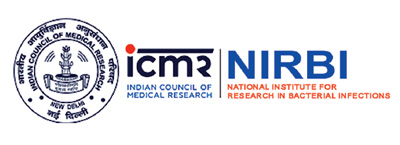ICMR - National Institute for Research
in Bacterial Infections
आईसीएमआर - राष्ट्रीय जीवाणु संक्रमण अनुसंधान संस्थान
Department of Health Research, Ministry of Health and Family Welfare, Government of India
स्वास्थ्य अनुसंधान विभाग, स्वास्थ्य और परिवार कल्याण मंत्रालय, भारत सरकार
WHO Collaborating Centre For Research and Training On Diarrhoeal Diseases
Division
Bioinformatics

Bioinformatics Division conducts research in interdisciplinary
areas to address clinical and biological problems using data
intensive computational modelling. Primary focus area of
research is pathogen genome evolution, computational drug
repurposing and disease outbreak prediction through harnessing
omics data and utilizing Artificial Intelligence based
technologies including machine learning and deep learning.
Our current area of interest is the application of artificial
intelligence in predictive models, which can direct epidemic
response strategies by identifying patterns and trends. Several
works fall under the umbrella of predictive modelling, including
risk prediction and disease forecasting, all of which can
facilitate targeted disease prevention and anticipate disease
spread. Evolution of treatment paradigms and the growing
importance of AI and digital therapeutics has prompted us in
development of artificial intelligence algorithms and techniques
to identify potential new uses of existing FDA approved drugs.
Our division conducts research at the integration of molecular
evolution, molecular epidemiology, and molecular genetics
through the development of computational modelling techniques.
With the availability of large number of genome sequences in
public domain bio-informatics methods have been used to
understand features, function, structure, or evolution of the
genome sequences. Our thrust area is the analysis of genome
sequences of priority and emerging human pathogens. Our group
also works on host-pathogen systems biology to examine the
interactions of biological components in order to derive
underlying information about associated comorbidities, infection
dynamics and potential drug targets. Apart from this, we deal
with integration of various omics data to understand host
molecular level reaction due to pathogen infection, and identify
potential drug targets and biomarkers for disease intervention.
We engage ourselves regularly in various collaborative clinical
and biological studies to provide valuable insight into pathogen
spread and prevention. Genome assembly, variant calling,
phylogenetics, of various clinical and metagenomic raw reads and
prediction of protein structures and interaction mark our few
collaborative endeavours. PhD programme is conducted in the
Department of Bioinformatics. Post graduate students from
various universities/institutes carry out their dissertation
work throughout the year.
Ongoing Projects
:Extramural:
1. DHR funded project on “Development of next generation drug library and information resource of the alternative therapeutic use of FDA approved drugs by Kernel-based machine learning integration of molecular structure, molecular activity and phenotypic data”.
2. ICMR funded project on “Efficacy of newly isolated lytic Shigella phage cocktails on Shigella flexneri planktonic cultures and biofilms”.
Completed Projects
:Extramural:
1. ICMR funded project on “Computational molecular modelling and interaction study between ACE2 receptors from diverse Indian human genomes with spike protein variants of SRAS-CoV2”.
Intramural:
1. “Analysis of genetic diversity and evolution of dengue virus using completely sequenced genomes”
2. “Multi omics approach towards drug repositioning for dengue virus infection”


